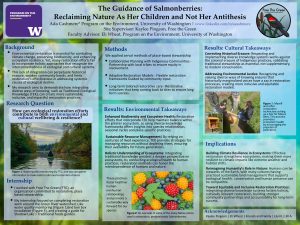The Guidance of Salmonberries: How we can Reclaim Mother Nature as her Children and not her Antithesis
My research addresses the critical role traditional foods play in ecological restoration, focusing on cultural resilience and biodiversity. Pacific Northwest Ecosystems that sustain our species are struggling in the changing climate, and modern society limits itself in its ability to help them. Analyzing native plants such as Salmonberry, along with Fireweed, Wapato, Huckleberry, and more highlights how Indigenous stewardship practices foster reciprocal relationships with ecosystems. The aim of this work is to contribute to the ongoing conversation on the necessity of integrating Traditional Ecological Knowledge (TEK) into modern restoration efforts, specifically to confront both cultural and ecological degradation. To achieve this, I conducted fieldwork with Free the Green, focusing on invasive species removal and native plant reintroduction, alongside a thorough review on current scholarship and literature of paleoecology and Indigenous foodways. Combining hands-on restoration and scholarly inquiry provides a strong framework for understanding the lasting impact of our cultural relationship to ‘nature’ on ecosystem health. Findings show that the inclusion of TEK in restoration practices supports reciprocal stewardship practices, enhances ecosystem resilience, and helps mend the historical trauma of land dispossession. This work suggests that deconstruction of the settler-colonial paradigm of pristine wilderness and collaboration with Indigenous knowledge systems is vital for effective restoration and cultural healing. The research underscores the importance of adopting a holistic view of nature and advocates for the inclusion of Indigenous voices in policy, education, and restoration strategies. This integrative approach is essential for fostering long-term sustainability and addressing the climate crisis.
